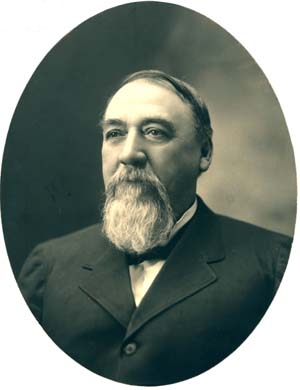J. J. McAlester facts for kids
Quick facts for kids
James Jackson McAlester
|
|
|---|---|
 |
|
| 2nd Lieutenant Governor of Oklahoma | |
| In office January 9, 1911 – January 11, 1915 |
|
| Governor | Lee Cruce |
| Preceded by | George W. Bellamy |
| Succeeded by | Martin E. Trapp |
| Personal details | |
| Born | October 1, 1842 Sebastian County, Arkansas |
| Died | September 21, 1920 (aged 77) McAlester, Oklahoma |
| Political party | Democratic |
| Spouse | Rebecca Burney |
| Profession | Confederate States Army captain, politician, coal mine owner, banker, merchant, United States Marshal and rancher |
James Jackson McAlester (born October 1, 1842 – died September 21, 1920) was an important person in Oklahoma's history. He was a soldier and a businessman. He founded the city of McAlester, Oklahoma and helped start the coal mining business in eastern Oklahoma. He also held several important government jobs. He was a U.S. Marshal for Indian Territory, a member of the first Oklahoma Corporation Commission, and the second Lieutenant Governor of Oklahoma.
Contents
Early Life and Business Ventures
James Jackson McAlester was born in Sebastian County, Arkansas on October 1, 1842. He grew up in Fort Smith, Arkansas. After serving in the Confederate Army, he returned to Fort Smith. There, he met an engineer named Oliver Weldon. Weldon told him about places where coal could be found in the area then known as Indian Territory. This area is now part of Oklahoma.
In 1866, McAlester moved to the Choctaw Nation in Indian Territory. He started working as a trader, buying and selling goods with the Native American tribes. This helped him learn a lot about the region and its people.
Family and Property Rights
On August 22, 1872, James McAlester married Rebecca Burney. She was born in Mississippi in 1841 and was a member of the Chickasaw Nation. Marrying Rebecca was very important for James. It allowed him to become a citizen of both the Choctaw and Chickasaw Nations. This meant he could legally own property in these areas.
Using the information he got from Oliver Weldon, McAlester found many valuable coal deposits. He started a company that later became the McAlester Coal Mining Company. He also opened a trading business called J. J. McAlester Mercantile Company. This store acted as a "company store" for the miners. Often, miners were paid with special money called scrip. This scrip could only be used to buy things at McAlester's store.
McAlester House
The home of J. J. McAlester in McAlester, Oklahoma, is a historic place. It is called McAlester House. This house is listed on the National Register of Historic Places listings in Pittsburg County, Oklahoma. This means it is an important building that is kept safe because of its history.
Political Career
James J. McAlester was a member of the Democratic Party. He decided to run for Lieutenant Governor of Oklahoma. In the election, he received 118,544 votes, which was about 49.3% of all votes. He won against Gilbert Dukes, the Republican candidate, who got 94,621 votes.
Serving as Lieutenant Governor
McAlester became the second Lieutenant Governor of Oklahoma. He served from January 9, 1911, to January 11, 1915. During his time in office, he sometimes served as the "acting governor" of Oklahoma. This happened when the main governor, Lee Cruce, was away from the state. This shows how important his role was in the state government.
Later Life and Legacy
James J. McAlester passed away on September 21, 1920, in McAlester, Oklahoma. His wife, Rebecca Burney, had passed away before him. They had four children together, including a set of twin girls. All their children were born in Indian Territory.
Connection to True Grit
J. J. McAlester's store became famous in a different way. It was the inspiration for the store visited by the character Rooster Cogburn in the novel True Grit. This book was written by Charles Portis in 1968. The story was later made into two popular movies, one in 1969 and another in 2010.
 | Kyle Baker |
 | Joseph Yoakum |
 | Laura Wheeler Waring |
 | Henry Ossawa Tanner |

